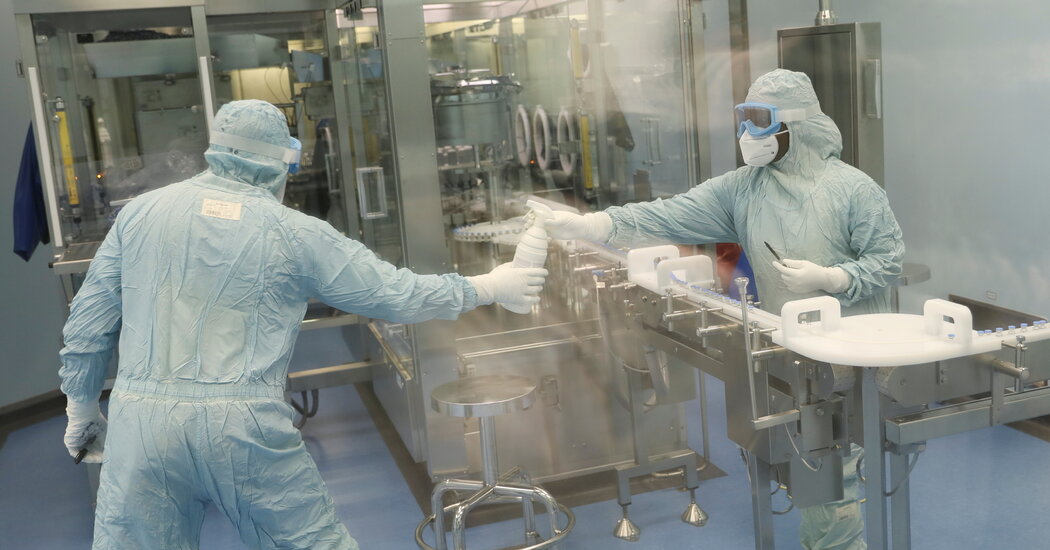
Merck has granted a royalty-free license for its promising Covid-19 pill to a United Nations-backed nonprofit in a deal that would allow the drug to be manufactured and sold cheaply in the poorest nations, where vaccines for the coronavirus are in devastatingly short supply.
The agreement with the Medicines Patent Pool, an organization that works to make medical treatment and technologies globally accessible, will allow companies in 105 countries, mostly in Africa and Asia, to sublicense the formulation for the antiviral pill, called molnupiravir, and begin making it.
Merck reported this month that the drug halved the rate of hospitalizations and deaths in high-risk Covid patients in a large clinical trial. Affluent nations, including the United States, have rushed to negotiate deals to buy the drug, tying up large portions of the supply even before it has been approved by regulators and raising concerns that poor countries would be shut out of access to the medicine, much as they have been for vaccines.
Treatment-access advocates welcomed the new deal, which was announced Wednesday morning, calling it an unusual step for a major Western pharmaceutical company.
“The Merck license is a very good and meaningful protection for people living in countries where more than half of the world’s population lives,” said James Love, who leads Knowledge Ecology International, a nonprofit research organization. “It will make a difference.”
Charles Gore, director of the Medicines Patent Pool, said: “This is the first transparent public health license for a Covid medicine, and really importantly, it is for something that could be used outside of hospitals, and which is potentially going to be very cheap.”
“This is hopefully going to make things a lot easier in terms of keeping people out of hospital and stopping people dying in low- and middle-income countries,” he said.
Mr. Gore said that more than 50 companies, from all regions of the developing world, have already approached the organization about obtaining a sublicense.
The agreement with Merck, Mr. Gore said, is also critically important as a precedent. “I hope this will start a landslide of people coming to the Medicines Patent Pool, wanting to do licensing, because there’s no question that access has been the problem,” he said. “From a scientific point of view, industry have done a really brilliant job — firstly, providing the vaccines, and now providing treatments. But the access side of it has let the whole thing down.”
Pfizer also has a Covid antiviral pill in late-stage trials, and Mr. Gore said the company is also in talks with the patent pool.
Molnupiravir was developed by Merck and Ridgeback Biotherapeutics of Miami, based on a molecule first studied at Emory University in Atlanta. All three organizations are party to this deal, which will not require a fee from any sublicensing company.
Merck has submitted its clinical trial data to the Food and Drug Administration seeking emergency-use authorization; a decision could come in early December. Regulatory agencies in other nations that produce a version of molnupiravir will need to evaluate it. Some drug manufacturers will likely seek World Health Organization prequalification for their versions, so that they can bypass the country-by-country regulatory steps.
Stephen Saad, chief executive of Aspen Pharmacare in South Africa, said his company expects to apply for a license to make molnupiravir and distribute it across Africa. He said that he believed that Aspen could make the drug for about $20 per course. The U.S. government has an agreement to buy 1.7 million courses of the drug, pending its authorization by the F.D.A., a deal that fixes the price at $712 per course.
Mr. Gore said that he has been told by some in the field that a generic version of molnupiravir could be profitably produced for as little as $8 per course.
Under the licensing deal, Merck would continue to produce and sell the drug in wealthy nations and many middle-income ones at significantly higher prices.
Merck had already taken the step of licensing eight large Indian drug makers to produce generic versions of molnupiravir, pending authorization. But the company feared that production in just one region would not be enough to ensure rapid access to the drug across the developing world, said Jenelle Krishnamoorthy, Merck’s vice president for global policy.
So the company also engaged in talks with the patent pool, which has deep experience in working with a network of global drug makers that can meet high-quality standards, including those required for W.H.O. prequalification, she said.
“We knew we had to work faster, we had to do things we hadn’t done before, we had be more efficient,” Ms. Krishnamoorthy said.
The licenses that Merck issued to the Indian generic makers restricts sales to developing countries and excludes most middle-income ones, including China and Russia — the site of a current raging Covid outbreak — raising the possibility that citizens in these nations, which often have weak health systems, will not get access to the drug.
The patent pool agreement for molnupiravir also excludes middle-income countries and most nations in Latin America, Mr. Love said.
“What are you going to do for countries like Chile or Colombia, Thailand or Mexico?” he asked. “They’re not in the license.”
